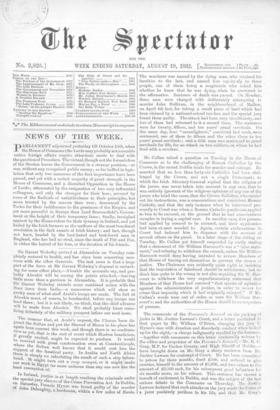Mr. Callan raised a question on Tuesday in the House
of Commons as to the challenging of Roman Catholics by the Crown, in the recent Dublin trials for murder and outrage. He asserted that no less than forty-six Catholics had been chal- lenged by the Crown, and not a single Protestant; to which the Irish Attorney-General replied that the religion of the jurors was never taken into account in any case, that lie was entirely ignorant of the religious opinions of any one of the jurors who tried the cases, that the Crown Solicitor, who carried out his instructions, was a conscientious and consistent Roman. Catholic, and that the only instance when he intervened per- sonally in Court was when a Roman Catholic gentleman applied. to him to be excused, on the ground. that he had conscientious scruples in trying a capital case. In another case, five persons had applied by counsel to be excused, and their applicatiou had been at once acceded to. Again, certain exclamations in Court had induced him to dispense with the services of several others on the panel. In a later stage of the sitting on Tuesday, Mr. Callan got himself suspended by curtly stating that a statement of Sir William Harcourt's was a" false state- ment," and refusing to withdraw the remark, unless Sir William Harcourt would deny having intended to accuse Members of that House of having set themselves to prevent the course of justice. The Chairman was evidently quite right in insisting that the imputation of falsehood should be withdrawn ; bat we think him quite in the wrong in not also requiring Sir W. Har- court to withdraw the very unparliamentary statement that Members of that House had renewed "that species of agitation against the administration of justice, in order to secure for crime that impunity which it had 'originally enjoyed." If Mr. Callan's words were out of order, so were Sir William Har- court's ; and the authorities of the House should be no respecters of persons.






























